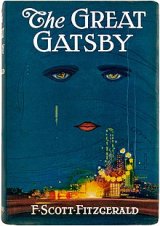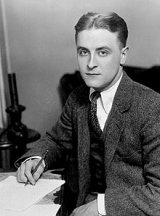The Great Gatsby Page #16
The Great Gatsby is a 1925 novel by American writer F. Scott Fitzgerald. Set in the Jazz Age on Long Island, near New York City, the novel depicts first-person narrator Nick Carraway's interactions with mysterious millionaire Jay Gatsby and Gatsby's obsession to reunite with his former lover, Daisy Buchanan. The novel was inspired by a youthful romance Fitzgerald had with socialite Ginevra King, and the riotous parties he attended on Long Island's North Shore in 1922
“ ‘Let the bastards come in here if they want you, Rosy, but don’t you, so help me, move outside this room.’ “It was four o’clock in the morning then, and if we’d of raised the blinds we’d of seen daylight.” “Did he go?” I asked innocently. “Sure he went.” Mr. Wolfshiem’s nose flashed at me indignantly. “He turned around in the door and says: ‘Don’t let that waiter take away my coffee!’ Then he went out on the sidewalk, and they shot him three times in his full belly and drove away.” “Four of them were electrocuted,” I said, remembering. “Five, with Becker.” His nostrils turned to me in an interested way. “I understand you’re looking for a business gonnegtion.” The juxtaposition of these two remarks was startling. Gatsby answered for me: “Oh, no,” he exclaimed, “this isn’t the man.” “No?” Mr. Wolfshiem seemed disappointed. “This is just a friend. I told you we’d talk about that some other time.” “I beg your pardon,” said Mr. Wolfshiem, “I had a wrong man.” A succulent hash arrived, and Mr. Wolfshiem, forgetting the more sentimental atmosphere of the old Metropole, began to eat with ferocious delicacy. His eyes, meanwhile, roved very slowly all around the room—he completed the arc by turning to inspect the people directly behind. I think that, except for my presence, he would have taken one short glance beneath our own table. “Look here, old sport,” said Gatsby, leaning toward me, “I’m afraid I made you a little angry this morning in the car.” There was the smile again, but this time I held out against it. “I don’t like mysteries,” I answered, “and I don’t understand why you won’t come out frankly and tell me what you want. Why has it all got to come through Miss Baker?” “Oh, it’s nothing underhand,” he assured me. “Miss Baker’s a great sportswoman, you know, and she’d never do anything that wasn’t all right.” Suddenly he looked at his watch, jumped up, and hurried from the room, leaving me with Mr. Wolfshiem at the table. “He has to telephone,” said Mr. Wolfshiem, following him with his eyes. “Fine fellow, isn’t he? Handsome to look at and a perfect gentleman.” “Yes.” “He’s an Oggsford man.” “Oh!” “He went to Oggsford College in England. You know Oggsford College?” “I’ve heard of it.” “It’s one of the most famous colleges in the world.” “Have you known Gatsby for a long time?” I inquired. “Several years,” he answered in a gratified way. “I made the pleasure of his acquaintance just after the war. But I knew I had discovered a man of fine breeding after I talked with him an hour. I said to myself: ‘There’s the kind of man you’d like to take home and introduce to your mother and sister.’ ” He paused. “I see you’re looking at my cuff buttons.” I hadn’t been looking at them, but I did now. They were composed of oddly familiar pieces of ivory. “Finest specimens of human molars,” he informed me. “Well!” I inspected them. “That’s a very interesting idea.” “Yeah.” He flipped his sleeves up under his coat. “Yeah, Gatsby’s very careful about women. He would never so much as look at a friend’s wife.” When the subject of this instinctive trust returned to the table and sat down Mr. Wolfshiem drank his coffee with a jerk and got to his feet. “I have enjoyed my lunch,” he said, “and I’m going to run off from you two young men before I outstay my welcome.” “Don’t hurry Meyer,” said Gatsby, without enthusiasm. Mr. Wolfshiem raised his hand in a sort of benediction. “You’re very polite, but I belong to another generation,” he announced solemnly. “You sit here and discuss your sports and your young ladies and your—” He supplied an imaginary noun with another wave of his hand. “As for me, I am fifty years old, and I won’t impose myself on you any longer.” As he shook hands and turned away his tragic nose was trembling. I wondered if I had said anything to offend him. “He becomes very sentimental sometimes,” explained Gatsby. “This is one of his sentimental days. He’s quite a character around New York—a denizen of Broadway.” “Who is he, anyhow, an actor?” “No.” “A dentist?” “Meyer Wolfshiem? No, he’s a gambler.” Gatsby hesitated, then added, coolly: “He’s the man who fixed the World’s Series back in 1919.” “Fixed the World’s Series?” I repeated. The idea staggered me. I remembered, of course, that the World’s Series had been fixed in 1919, but if I had thought of it at all I would have thought of it as a thing that merely happened, the end of some inevitable chain. It never occurred to me that one man could start to play with the faith of fifty million people—with the single-mindedness of a burglar blowing a safe. “How did he happen to do that?” I asked after a minute. “He just saw the opportunity.” “Why isn’t he in jail?” “They can’t get him, old sport. He’s a smart man.” I insisted on paying the check. As the waiter brought my change I caught sight of Tom Buchanan across the crowded room. “Come along with me for a minute,” I said; “I’ve got to say hello to someone.” When he saw us Tom jumped up and took half a dozen steps in our direction. “Where’ve you been?” he demanded eagerly. “Daisy’s furious because you haven’t called up.” “This is Mr. Gatsby, Mr. Buchanan.” They shook hands briefly, and a strained, unfamiliar look of embarrassment came over Gatsby’s face. “How’ve you been, anyhow?” demanded Tom of me. “How’d you happen to come up this far to eat?” “I’ve been having lunch with Mr. Gatsby.” I turned toward Mr. Gatsby, but he was no longer there. ------------------------------------------------------------------------ One October day in nineteen-seventeen— (said Jordan Baker that afternoon, sitting up very straight on a straight chair in the tea-garden at the Plaza Hotel) —I was walking along from one place to another, half on the sidewalks and half on the lawns. I was happier on the lawns because I had on shoes from England with rubber knobs on the soles that bit into the soft ground. I had on a new plaid skirt also that blew a little in the wind, and whenever this happened the red, white, and blue banners in front of all the houses stretched out stiff and said tut-tut-tut-tut, in a disapproving way. The largest of the banners and the largest of the lawns belonged to Daisy Fay’s house. She was just eighteen, two years older than me, and by far the most popular of all the young girls in Louisville. She dressed in white, and had a little white roadster, and all day long the telephone rang in her house and excited young officers from Camp Taylor demanded the privilege of monopolizing her that night. “Anyways, for an hour!” When I came opposite her house that morning her white roadster was beside the kerb, and she was sitting in it with a lieutenant I had never seen before. They were so engrossed in each other that she didn’t see me until I was five feet away. “Hello, Jordan,” she called unexpectedly. “Please come here.” I was flattered that she wanted to speak to me, because of all the older girls I admired her most. She asked me if I was going to the Red
Translation
Translate and read this book in other languages:
Select another language:
- - Select -
- 简体中文 (Chinese - Simplified)
- 繁體中文 (Chinese - Traditional)
- Español (Spanish)
- Esperanto (Esperanto)
- 日本語 (Japanese)
- Português (Portuguese)
- Deutsch (German)
- العربية (Arabic)
- Français (French)
- Русский (Russian)
- ಕನ್ನಡ (Kannada)
- 한국어 (Korean)
- עברית (Hebrew)
- Gaeilge (Irish)
- Українська (Ukrainian)
- اردو (Urdu)
- Magyar (Hungarian)
- मानक हिन्दी (Hindi)
- Indonesia (Indonesian)
- Italiano (Italian)
- தமிழ் (Tamil)
- Türkçe (Turkish)
- తెలుగు (Telugu)
- ภาษาไทย (Thai)
- Tiếng Việt (Vietnamese)
- Čeština (Czech)
- Polski (Polish)
- Bahasa Indonesia (Indonesian)
- Românește (Romanian)
- Nederlands (Dutch)
- Ελληνικά (Greek)
- Latinum (Latin)
- Svenska (Swedish)
- Dansk (Danish)
- Suomi (Finnish)
- فارسی (Persian)
- ייִדיש (Yiddish)
- հայերեն (Armenian)
- Norsk (Norwegian)
- English (English)
Citation
Use the citation below to add this book to your bibliography:
Style:MLAChicagoAPA
"The Great Gatsby Books." Literature.com. STANDS4 LLC, 2025. Web. 24 Feb. 2025. <https://www.literature.com/book/the_great_gatsby_1598>.








Discuss this The Great Gatsby book with the community:
Report Comment
We're doing our best to make sure our content is useful, accurate and safe.
If by any chance you spot an inappropriate comment while navigating through our website please use this form to let us know, and we'll take care of it shortly.
Attachment
You need to be logged in to favorite.
Log In